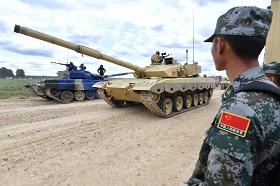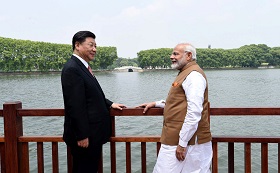Geopolitics, as an autonomous discipline, has a very particular cultural genesis, and it is not possible to ignore the deepening of the era in which it developed. His great forefathers can be considered the first geographers who in the nineteenth century began to think of the world as a relationship between human groups and territorial spaces. This relationship, of course, produced organizational differences and particularities, and in turn was produced by contextual differences and particularities, in a two-way relationship. This is the concept that will later be called localization. This is how geography, according to its first systematizers, could be nothing more than "anthropic geography".
Culture, ideology, state of the technique, economic organization, are all aspects that contribute to options that are however allowed or not by existing structural factors: not an iron determination, but a set of possibilities guaranteed or not by geographic morphology. And what determination is basically greater than that of the sea, the limit par excellence of the mainland?
Thinking about geopolitics through water allows us to understand the limit point of the telluric foundation, to imagine the spaces as they are cut out from the geographical data even before the human one, to understand how much the sea flow can condition and have conditioned the mechanics of relations between peoples.
To date, perhaps the domination of water has reduced its importance following the extensive use of air but still remains primary. Moreover, as is known, «the scarcity of water or its reduced quality, due to pollution, produce emigrations, famines, internal disorders, pandemics and wars », and to date these problems are increasing. Together with the growing limitations to access water of some populations, we also see the redefinition of the coasts due to climate change. All these factors cannot fail to induce us to think about the world through water.
Geopolitics, as an autonomous discipline, has a very particular cultural genesis, and it is not possible to ignore the deepening of the era in which it developed. His great forefathers can be considered the first geographers who in the nineteenth century began to think of the world as a relationship between human groups and territorial spaces. This relationship, of course, produced organizational differences and particularities, and in turn was produced by contextual differences and particularities, in a two-way relationship. This is the concept that will later be called localization [1]. This is how geography, according to its first systematizers, could be nothing more than "anthropic geography".
Two great initiators of this type of discourse can be considered Karl Ritter and Friedrich Ratzel:
«Karl Ritter (1789–1859), German geographer, explores the relationship between the social and historical phenomena of man and the physical factors of the geographical environment. It is considered among the founders of modern geography. Over the years [he came] to an organicistic vision of the earth, where all its physical elements (rivers, mountains, glaciers, etc.) are seen as integral parts of a living organism, in relation with the other beings that inhabit it. Within this conception, man is in close correspondence with the elements of his habitat: his history, the forms of his social organization are therefore conditioned by it.
[...] Friedrich Ratzel (1844-1904), German geographer and ethnologist, [was] the founder of anthropic geography, also called human geography and anthropogeography, based on the study of the distribution and manifestation of human phenomena on earth. It aims in particular to study how human societies adapt to the environment in which they live and how they interact.» [2]
These two authors have vastly influenced the development of geopolitics in different aspects, starting from the German school of Karl Haushofer. A certain type of approach focused on the almost inextricable link between man and the environment will find greater expansion in the ideas on the noosphere of Vladimir Vernadskij or on the passionarity of Lev Gumilëv, sometimes giving rise to deterministic extremes in the strict sense.
Although some interpreters of these authors still have a certain deterministic accent, it must be said, however, that the critique of determinism is precisely the heart of geopolitical doctrine, which introjects on this type of studies a whole other series of elements of analysis:
«Geopolitics is the synthesis of the world geographic landscape [...] and it is [...] the synthesis of the geographical, historical-political-social causes of the spatial dynamics of society. As such it goes beyond the sphere of political geography, that is more than political geography […] in short, it is the supreme ratio of geographical events. It is not a branch of geography […] but a synthesis of the dynamic branches of geographical science.» [3]
Thus was specified in the Italian magazine Geopolitica, the one that dealt with the matter first in Italy, in the first half of the twentieth century [4], and on the basis of this added:
«[It] cannot adhere to a determinism that considers man and society incapable of overcoming environmental phenomena.» [5]
Long before this, a criticism had already begun by those who, studying Ratzel, had learned its fundamental lesson on the relationship between man and territory, but had understood that there was something further to understand the world with respect to its geodeterminism [
6]. Think, for example, of the famous criticism of this type of one-dimensional approach by Franz Boas.
«[The deterministic approach was] applied by Boas to his first research work on the Eskimos (Inuit) of the island of Baffin in 1883. Initially driven by this expedition from his geographical interests, Boas intends to deepen the connections that are established between the physical and geographical scenario in which the Inuit live and their knowledge and practices in that same context. In other words, inspired by Ritter's theories of environmental determinism and the so-called anthropogeographic school of Ratzel, Boas is convinced of the decisive influence of the environment on culture. Instead, it is precisely the ethnographic study of these populations that, far from confirming this perspective, convinces him of the contrary, that is, men tend to develop survival strategies and practices that go far beyond the possibilities directly suggested by the surrounding environment.
[...] Like Durkheim in France, in those same years Boas began to argue that these facts should be understood in their own terms, without calling into question monocausal determinations, such as those relating to the environment. The latter, in fact, certainly exerts conditioning, but not to the point of no longer being able to conceive or explain social and cultural facts autonomous from nature.» [7]
Haushofer himself, together with Mackinder, one of the founding fathers of the geopolitical discipline, with his political theory of pan-ideas overcame the fundamentally ethnic conception of Ratzel's lebensraum (among other things, this and his idea of collaboration with the Soviet Union earned him internment in Dachau). Indeed, Haushofer wrote:
«Geopolitics is and should be the geographical conscience of the state. [Its subject matter is] to study the major vital correlations of modern man within modern space and its aim is to coordinate phenomena that link to state with space.» [8]
The elements of statehood, including the possible awareness or otherwise that the state may have of the potential of its geographical position, the "modernity" of man and the spaces of which Haushofer spoke, the means of locomotion and the technique, are all elements that they helped to create not only a dimension of multiplication of factor analysis levels, but to revolutionize the deterministic attitude of the previous century.
As we know, territory and its morphology assume a main importance in geopolitics. The geographical element that conditions political relations is one of the factors of this discipline. As Mackinder will understand, at the dawn of geopolitical reasoning, if the earth is the space on which we live and on which we mainly do politics, the sea as an element of delimitation and as a real technical tool, is a very important factor [9]. Carlo Jean writes:
«Water can be used as a defense or attack tool; in fact, not only the seas and oceans, but also rivers and lakes can constitute both ways of communication and strategic penetration, and protective obstacles.
[...] Water is a determining element in geopolitics, since most of the borders between states develop along rivers, lakes and ridge lines, which separate different water basins. Often, a river or a ridge line is considered the natural frontier of a community, and as such they take on symbolic value and determine geopolitical perceptions and rivalries.» [10]
Water, be it a sea, a lake or a river, first cuts out the habitable spaces and resizes the environments of conflict and politics. It has, if we want, a perimeter value. One of its uses is to facilitate division, which is a genetic moment in the organization of social groups. Furthermore, the fact that it constitutes a means of communication guarantees its usability as an instrument of conjunction or friction between the groups themselves. In short, it has a great instrumental potential. It is a constituent element of our aggregate life.
Water, like earth, has also been interpreted as a completely determining factor, or not. The first great anthropic geographer to be interested in the role of water in the constitution of different civilizations was Ernst Kapp. In the nineteenth century he developed a theory, the echo of which still finds its place in contemporary historiography, concerning the relationship of peoples with water [11]. In Kapp's thought a whole series of deterministic conceptions flowed into a single historical process, a great drama, as will be defined later [12]. For Kapp, who was also a philosopher of history and science, the evolution of civilization and technology, the development of social ethics and man's relationship with the environment were all parts of a single great process.
This process was divided into three stages of civilization: the first was that of potamic civilization, the ancient civilizations which, like Egypt or Mesopotamia, created their social and productive organization around large rivers (this type of definition is still widely used for these societies); the second was that of the talactic society, and referred to those civilizations that proliferated around the inland seas, with particular attention to the classical and medieval civilization of the Mediterranean; finally there would have been the oceanic civilization, whose birth was already outlined in the maritime power of Great Britain, and which would have constituted the last level of social evolution [13].
Dialectically, these principles were also picked up by another thinker, and at the same time criticized in their deterministic aspect: this is the reception that this idea of the different relationship that man has with the sea in Carl Schmitt, the famous German thinker, jurist and political philosopher.
It is famous how Carl Schmitt elaborated in a famous text, Land and Sea [14], a profile of contrast between the telluric and the maritime way of life. According to its definition, continental civilizations, telluric ones, had a different way of understanding life, economy and administration than maritime ones, which instead focused on colonial predation, mercantilism and war modes other than interstate ones. However, a third factor is added to these two models, which is precisely that of the talactic societies. They behave like telluric ones but have a different relationship with bodies of water and a better predisposition to trade [15].
The difference that we cannot fail to notice between Ernst Kapp's and Carl Schmitt's thoughts is this: as these civilizations constitute a series of three evolutionary stages for the former, so for the latter there is no historical determinant that necessarily transforms the relationship of man with water. Moreover, these models often end up living together synchronously, although clearly there are stages of technical development that allow, at a certain point in human history, to take better possession of ocean waters.
The imperial domination of Rome, for Schmitt, was the manifestation of the way of life of the talactic society which was opposed to Carthage, which had many aspects already of the oceanic society [16], as well as later the Crown of Spain, fighting for the colonies with the England will represent the last bulwark of the telluric conception before the end of common European law and Eurocentrism, although it often fought in the open sea and not in the inland seas [17].
In this regard, therefore, it becomes fundamental to understand the transition that England undergoes at any moment, which at a certain point of its existence, according to Schmitt, understands that its insular position can allow it to take off and finally become a fish [18].
«Obviously, England is an island. But with the ascertainment of this geographical fact, not much is said. There are many islands whose political destinies are very different. Sicily is also an island, even Ireland, Cuba, Madagascar and Japan. How many different and contrasting historical-world developments undoubtedly bind to these few names that all mark an island! In a sense, even the largest continents are all just islands and the whole inhabited earth is, as the Greeks already knew, surrounded by the ocean.» [19]
This means that culture, ideology, state of the technique, economic organization, are all aspects that contribute to options that are however allowed or not by existing structural factors: not an iron determination, but a set of possibilities guaranteed or not by geographic morphology. And what determination is basically greater than that of the sea, the limit par excellence of the mainland?
Thinking about geopolitics through water allows us to understand the limit point of the telluric foundation, to imagine the spaces as they are cut out from the geographical data even before the human one, to understand how much the sea flow can condition and have conditioned the mechanics of relations between peoples.
To date, perhaps the domination of water has reduced its importance following the extensive use of air but still remains primary. Moreover, as is known, «the scarcity of water or its reduced quality, due to pollution, produce emigrations, famines, internal disorders, pandemics and wars [20]», and to date these problems are increasing. Together with the growing limitations to access water of some populations, we also see the redefinition of the coasts due to climate change.
All these factors cannot fail to induce us to think about the world through water. To do this we cannot ignore the authors who anticipated the issues of geopolitical discipline, while admitting the need for some methodological corrections. After all, what Ernst Kapp teaches us is that
«The necessary condition of all true historical knowledge is the philosophical knowledge of the Earth which can be considered as a preparatory school for politics: each place is in its becoming an observatory of its history; every act of the human will is potentially limited to a space delimited and inscribed in geography.» [21]
Only such a concrete realization can take us out of the deterministic aphasia that seems to have re-proposed itself in our day.
1. Carl Schmitt, Il nomos della terra nel diritto internazionale dello «Jus publicum europaeum», Adelphi, 1991.
2. Sandro Piermattei, Antropologia ambientale e paesaggio agrario, Morlacchi Editore, 2007, p. 68 (translated).
3. Inquadrature, in Geopolitica, anno II numero 8-9, agosto-settembre 1940 (translated).
4. Giulio Sinibaldi, La geopolitica in Italia (1939-1942), Edizioni Webster Srl, 2010.
5. Inquadrature, in Geopolitica, anno II numero 8-9, agosto-settembre 1940 (translated).
6. Which, however, is partly questioned today: cfr. Alexandros Stogiannos, The Genesis of Geopolitics and Friedrich Ratzel. Dismissing the Myth of the Ratzelian Geodeterminism, Springer, 2019.
7. Sandro Piermattei, Antropologia ambientale e paesaggio agrario, Morlacchi Editore, 2007, pp. 68-69 (translated).
8. Quoted in Alexandros Stogiannos, The Genesis of Geopolitics and Friedrich Ratzel. Dismissing the Myth of the Ratzelian Geodeterminism, Springer, 2019.
9. Halford Mackinder, Democratic Ideals and Reality – The Geografical Pivot of History, Origami Books, 2019.
10. Carlo Jean, Geopolitica del mondo contemporaneo, Editori Laterza, 2012 (translated).
11. Ernst Kapp, Philosophische oder vergleichende allgemeine Erdkunde als wissenschaftliche Darstellung der Erdverhältnisse und des Menschenlebens, Braunschweig, 1845.
12. Carl Schmitt, Terra e mare. Una riflessione sulla storia del mondo, Adelphi, 2002.
13. Ernst Kapp, Philosophische oder vergleichende allgemeine Erdkunde als wissenschaftliche Darstellung der Erdverhältnisse und des Menschenlebens, Braunschweig, 1845.
14. Carl Schmitt, Terra e mare. Una riflessione sulla storia del mondo, Adelphi, 2002.
15. Ibidem.
16. Ibidem.
17. Carl Schmitt, Il nomos della terra nel diritto internazionale dello «Jus publicum europaeum», Adelphi, 1991.
18. Carl Schmitt, Terra e mare. Una riflessione sulla storia del mondo, Adelphi, 2002.
19. Ibidem.
20. Carlo Jean, Geopolitica del mondo contemporaneo, Editori Laterza, 2012.
21. Claude Raffestin, La sfida della geografia tra poteri e mutamenti globali, in Documenti Geografici, n. 1 anno 2012, p. 57.







